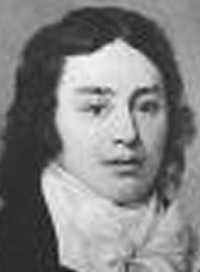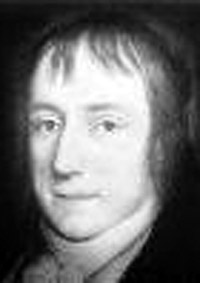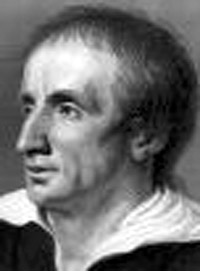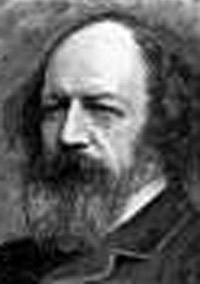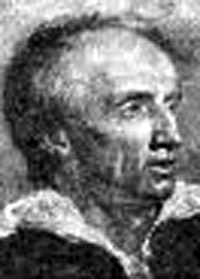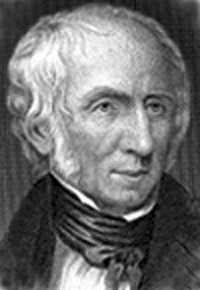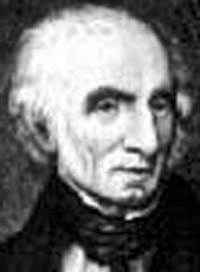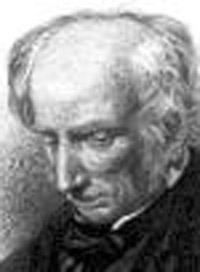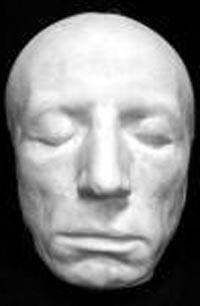Copyright Michael D. Robbins 2005
Astro-Rayological Interpretation & Charts
Quotes
Biography
Images and Physiognomic Interpretation
William Wordsworth—Poet: April 7, 1770, Cockermouth, England, 10:00 PM, LMT. (Source: Famous Nativities) Died, April 23, 1850, Rydal Mount, England. (One of the most highly regarded English poets.
(Ascendant, Scorpio; MC, Virgo, with MC conjunct the Moon from H10 and Neptune from H9; Sun and Venus conjunct in Aries, H5; Mercury and Pisces conjunct in H4; Mars in Aquarius; Jupiter in Sagittarius; Saturn in Cancer; Uranus in Taurus; Pluto in Capricorn)
A multitude of causes unknown to former times are now acting with a combined force to blunt the discriminating powers of the mind, and unfitting it for all voluntary exertion to reduce it to a state of almost savage torpor.
A reasoning, self-sufficing thing, An intellectual all-in-all!
But an old age serene and bright, and lovely as a Lapland night, shall lead thee to thy grave.
Come forth into the light of things, Let Nature be your teacher.
Faith is a passionate intuition.
(Neptune & Moon conjunct MC)Fill your paper with the breathings of your heart.
For I have learned to look on nature, not as in the hour of thoughtless youth, but hearing oftentimes the still, sad music of humanity.
Give all thou canst; high Heaven rejects the lore of nicely-calculated less or more.
Golf is a day spent in a round of strenuous idleness.
Happier of happy though I be, like them I cannot take possession of the sky, mount with a thoughtless impulse, and wheel there, one of a mighty multitude whose way and motion is a harmony and dance magnificent.
Hearing often-times the still, sad music of humanity, nor harsh nor grating, though of ample power to chasten and subdue.
(Saturn in Cancer square Sun)Heaven lies about us in our infancy! Shades of the prison-house begin to close upon the growing boy.
(Sun in 5th house)How does the Meadow flower its bloom unfold? Because the lovely little flower is free down to its root, and in that freedom bold.
Huge and mighty forms that do not live like living men, moved slowly through the mind by day and were trouble to my dreams.
I traveled among unknown men, in lands beyond the sea; nor England! did I know till then what love I bore to thee.
In modern business it is not the crook who is to be feared most, it is the honest man who doesn't know what he is doing.
In stray gifts to be claimed by whoever shall find.
In that sweet mood when pleasant thoughts bring sad thoughts to the mind.
Life is divided into three terms - that which was, which is, and which will be. Let us learn from the past to profit by the present, and from the present to live better in the future.
Lost in a gloom of uninspired research.
Neither evil tongues, rash judgements, nor the sneers of selfish men, nor greetings where no kindness is, nor all the dreary intercourse of daily life, shall e'er prevail against us.
No motion has she now, no force; she neither hears nor sees; rolled around in earth's diurnal course, with rocks, and stones, and trees.
One impulse from a vernal wood May teach you more of man, Of moral evil and of good, Than all the sages can.
Our birth is but a sleep and a forgetting. Not in entire forgetfulness, and not in utter nakedness, but trailing clouds of glory do we come.
(Venus conjunct Sun)Pictures deface walls more often than they decorate them.
Rapine, avarice, expense, This is idolatry; and these we adore; Plain living and high thinking are no more.
She dwelt among the untrodden ways Beside the springs of Dove, A maid whom there were none to praise And very few to love.
Small service is true service, while it lasts.
(Virgo Moon)That best portion of a man's life, his little, nameless, unremembered acts of kindness and love.
That though the radiance which was once so bright be now forever taken from my sight. Though nothing can bring back the hour of splendor in the grass, glory in the flower. We will grieve not, rather find strength in what remains behind.
The Child is the father of the Man.
The flower that smells the sweetest is shy and lowly.
The human mind is capable of excitement without the application of gross and violent stimulants; and he must have a very faint perception of its beauty and dignity who does not know this.
The mind that is wise mourns less for what age takes away; than what it leaves behind.
The ocean is a mighty harmonist.
The thought of our past years in me doth breed perpetual benedictions.
The world is too much with us; late and soon, getting and spending, we lay waste our powers: Little we see in Nature that is ours.
This city now doth, like a garment, wear the beauty of the morning; silent bare, ships, towers, domes, theatres and temples lie open unto the fields and to the sky; All bright and glittering in the smokeless air.
To begin, begin.
(Aries Sun)To me the meanest flower that blows can give thoughts that do often lie too deep for tears.
What is pride? A rocket that emulates the stars.
What we need is not the will to believe, but the wish to find out.
When from our better selves we have too long been parted by the hurrying world, and droop. Sick of its business, of its pleasures tired, how gracious, how benign in solitude.
Wisdom is oftentimes nearer when we stoop than when we soar.
With an eye made quiet by the power of harmony, and the deep power of joy, we see into the life of things.
(Sun conjunct Venus)My heart leaps up when I behold
A rainbow in the sky:
British writer, one of the great British poets of the Romantic era, best known for his nature poems and sonnets. Wordsworth felt deeply the kinship between nature and the sould of humankind. Educated at St. John's College in Cambridge, he took a walking tour through France and Switzerland, inspiring him to return to France where he graduated with a B.A. in 1791. For financial reasons, he returned to Racedown to settle with his sister, Dorothy. There he developed a close friendship with Coleridge, traveling to Germany in 1798 and returned to the Lake District in 1799.He was first published in 1798, "The Ancient Mariner" and "Tintern Alley." In 1800 his famous "Preface" was released in which he set forth his romantic movement. In 1813, he was appointed as revenue collector for Westmoreland and, in 1843, he was appointed Britain's Poet Laureate by Queen Victoria.While in France, he fell in love with Annette Vallon, with whom he had a daughter in December 1792. Wordsworth received an inheritance in 1795 and married Mary Hutchinson, a childhood friend, in 1802.He died at Rydal Mount and was buried at Grasmere, 4/23/1850.1770–1850, English poet, b. Cockermouth, Cumberland. One of the great English poets, he was a leader of the romantic movement in England.In 1791 he graduated from Cambridge and traveled abroad. While in France he fell in love with Annette Vallon, who bore him a daughter, Caroline, in 1792. Although he did not marry her, it seems to have been circumstance rather than lack of affection that separated them. Throughout his life he supported Annette and Caroline as best he could, finally settling a sum of money on them in 1835.The spirit of the French Revolution had strongly influenced Wordsworth, and he returned (1792) to England imbued with the principles of Rousseau and republicanism. In 1793 were published An Evening Walk and Descriptive Sketches, written in the stylized idiom and vocabulary of the 18th cent. The outbreak of the Reign of Terror prevented Wordsworth’s return to France, and after receiving several small legacies, he settled with his sister Dorothy in Dorsetshire. Wordsworth was extraordinarily close to his sister. Throughout his life she was his constant and devoted companion, sharing his poetic vision and helping him with his work.In Dorsetshire Wordsworth became the intimate friend of Samuel Taylor Coleridge and, probably under his influence, a student of David Hartley’s empiricist philosophy. Together the two poets wrote Lyrical Ballads (1798), in which they sought to use the language of ordinary people in poetry; it included Wordsworth’s poem “Tintern Abbey.” The work introduced romanticism into England and became a manifesto for romantic poets. In 1799 he and his sister moved to the Lake District of England, where they lived the remainder of their lives. A second edition of the Lyrical Ballads (1800), which included a critical essay outlining Wordsworth’s poetic principles, in particular his ideas about poetic diction and meter, was unmercifully attacked by critics.In 1802 Wordsworth married Mary Hutchinson, an old school friend; the union was evidently a happy one, and the couple had four children. The Prelude, his long autobiographical poem, was completed in 1805, though it was not published until after his death. His next collection, Poems in Two Volumes (1807), included the well-known “Ode to Duty,” the “Ode: Intimations of Immortality,” and a number of famous sonnets.Thereafter, Wordsworth’s creative powers diminished. Nonetheless, some notable poems were produced after this date, including The Excursion (1814), “Laodamia” (1815), “White Doe of Rylstone” (1815), Memorials of a Tour of the Continent, 1820 (1822), and “Yarrow Revisited” (1835). In 1842 Wordsworth was given a civil list pension, and the following year, having long since put aside radical sympathies, he was named poet laureate.AssessmentWordsworth’s personality and poetry were deeply influenced by his love of nature, especially by the sights and scenes of the Lake Country, in which he spent most of his mature life. A profoundly earnest and sincere thinker, he displayed a high seriousness comparable, at times, to Milton’s but tempered with tenderness and a love of simplicity. 7Wordsworth’s earlier work shows the poetic beauty of commonplace things and people as in “Margaret,” “Peter Bell,” “Michael,” and “The Idiot Boy.” His use of the language of ordinary speech was heavily criticized, but it helped to rid English poetry of the more artificial conventions of 18th-century diction. Among his other well-known poems are “Lucy” (“She dwelt among the untrodden ways”), “The Solitary Reaper,” “Resolution and Independence,” “Daffodils,” “The Rainbow,” and the sonnet “The World Is Too Much with Us.”Although Wordsworth was venerated in the 19th cent., by the early 20th cent. his reputation had declined. He was criticized for the unevenness of his poetry, for his rather marked capacity for bathos, and for his transformation from an open-minded liberal to a cramped conservative. In recent years, however, Wordsworth has again been recognized as a great English poet—a profound, original thinker who created a new poetic tradition.Wordsworth’s sister, Dorothy Wordsworth,Dorothy Wordsworth, 1771–1855, is known principally for her poems and for her journals, which have proved invaluable for later biographies and studies of the poet. These journals, the first of which was started in 1798, are written in delicate, exquisite diction, describing the Wordsworth household, friends, and travels. For the last 20 years of her life Dorothy Wordsworth was an invalid, suffering from an obscure illness that made her prematurely senile.major English Romantic poet and poet laureate of England (1843-50). His Lyrical Ballads (1798), written with Samuel Taylor Coleridge, helped launch the English Romantic movement.Wordsworth was born in the Lake District of northern England, the second of five children of a modestly prosperous estate manager. He lost his mother when he was 7 and his father when he was 13, upon which the orphan boys were sent off by guardian uncles to a grammar school at Hawkshead, a village in the heart of the Lake District. At Hawkshead Wordsworth received an excellent education in classics, literature, and mathematics, but the chief advantage to him there was the chance to indulge in the boyhood pleasures of living and playing in the outdoors. The natural scenery of the English lakes could terrify as well as nurture, as Wordsworth would later testify in the line "I grew up fostered alike by beauty and by fear," but its generally benign aspect gave the growing boy the confidence he articulated in one of his first important poems, "Lines Composed a Few Miles Above Tintern Abbey . . . ," namely, "that Nature never did betray the heart that loved her."Wordsworth moved on in 1787 to St. John's College, Cambridge. Repelled by the competitive pressures there, he elected to idle his way through the university, persuaded that he "was not for that hour, nor for that place." The most important thing he did in his college years was to devote his summer vacation in 1790 to a long walking tour through revolutionary France. There he was caught up in the passionate enthusiasm that followed the fall of the Bastille, and became an ardent republican sympathizer. Upon taking his Cambridge degree--an undistinguished "pass"--he returned in 1791 to France, where he formed a passionate attachment to a Frenchwoman, Annette Vallon. But before their child was born in December 1792, Wordsworth had to return to England and was cut off there by the outbreak of war between England and France. He was not to see his daughter Caroline until she was nine.The three or four years that followed his return to England were the darkest of Wordsworth's life. Unprepared for any profession, rootless, virtually penniless, bitterly hostile to his own country's opposition to the French, he knocked about London in the company of radicals like William Godwin and learned to feel a profound sympathy for the abandoned mothers, beggars, children, vagrants, and victims of England's wars who began to march through the sombre poems he began writing at this time. This dark period ended in 1795, when a friend's legacy made possible Wordsworth's reunion with his beloved sister Dorothy--the two were never again to live apart--and their move in 1797 to Alfoxden House, near Bristol. There Wordsworth became friends with a fellow poet, Samuel Taylor Coleridge, and they formed a partnership that would change both poets' lives and alter the course of English poetry.Their partnership, rooted in one marvelous year (1797-98) in which they "together wantoned in wild Poesy," had two consequences for Wordsworth. First it turned him away from the long poems on which he had laboured since his Cambridge days. These included poems of social protest like Salisbury Plain, loco-descriptive poems such as An Evening Walk and Descriptive Sketches (published in 1793), and The Borderers, a blank-verse tragedy exploring the psychology of guilt (and not published until 1842). Stimulated by Coleridge and under the healing influences of nature and his sister, Wordsworth began in 1797-98 to compose the short lyrical and dramatic poems for which he is best remembered by many readers. Some of these were affectionate tributes to Dorothy, some were tributes to daffodils, birds, and other elements of "Nature's holy plan," and some were portraits of simple rural people intended to illustrate basic truths of human nature.Many of these short poems were written to a daringly original program formulated jointly by Wordsworth and Coleridge, and aimed at breaking the decorum of Neoclassical verse. These poems appeared in 1798 in a slim, anonymously authored volume entitled Lyrical Ballads, which opened with Coleridge's long poem "The Rime of the Ancient Mariner" and closed with Wordsworth's "Tintern Abbey." All but three of the intervening poems were Wordsworth's, and, as he declared in a preface to a second edition two years later, their object was "to choose incidents and situations from common life and to relate or describe them . . . in a selection of language really used by men, . . . tracing in them . . . the primary laws of our nature." Most of the poems were dramatic in form, designed to reveal the character of the speaker. The manifesto and the accompanying poems thus set forth a new style, a new vocabulary, and new subjects for poetry, all of them foreshadowing 20th-century developments.The second consequence of Wordsworth's partnership with Coleridge was the framing of a vastly ambitious poetic design that teased and haunted him for the rest of his life. Coleridge had projected an enormous poem to be called "The Brook," in which he proposed to treat all science, philosophy, and religion, but he soon laid the burden of writing this poem upon Wordsworth himself. As early as 1798 Wordsworth began to talk in grand terms of this poem, to be entitled The Recluse. To nerve himself up to this enterprise and to test his powers, Wordsworth began writing the autobiographical poem that would absorb him intermittently for the next 40 years, and which was eventually published in 1850 under the title The Prelude, or, Growth of a Poet's Mind. The Prelude extends the quiet autobiographical mode of reminiscence that Wordsworth had begun in "Tintern Abbey" and traces the poet's life from his school days through his university life and his visits to France, up to the year (1799) in which he settled at Grasmere. It thus describes a circular journey--what has been called a long journey home. But the main events in the autobiography are internal: the poem exultantly describes the ways in which the imagination emerges as the dominant faculty, exerting its control over the reason and the world of the senses alike.The Recluse itself was never completed, and only one of its three projected parts was actually written; this was published in 1814 as The Excursion and consisted of nine long philosophical monologues spoken by pastoral characters. The first monologue (Book I) contained a version of one of Wordsworth's greatest poems, "The Ruined Cottage," composed in superb blank verse in 1797. This bleak narrative records the slow, pitiful decline of a woman whose husband had gone off to the army and never returned. For later versions of this poem Wordsworth added a reconciling conclusion, but the earliest and most powerful version was starkly tragic.In the company of Dorothy, Wordsworth spent the winter of 1798-99 in Germany, where, in the remote town of Goslar, in Saxony, he experienced the most intense isolation he had ever known. As a consequence, however, he wrote some of his most moving poetry, including the "Lucy" and "Matthew" elegies and early drafts toward The Prelude. Upon his return to England, Wordsworth incorporated several new poems in the second edition of Lyrical Ballads (1800), notably two tragic pastorals of country life, "The Brothers" and "Michael." These poems, together with the brilliant lyrics that were assembled in Wordsworth's second verse collection, Poems, in Two Volumes (1807), help to make up what is now recognized as his great decade, stretching from his meeting with Coleridge in 1797 until 1808.One portion of a second part of The Recluse was finished in 1806, but, like The Prelude, was left in manuscript at the poet's death. This portion, Home at Grasmere, joyously celebrated Wordsworth's taking possession (in December 1799) of Dove Cottage, at Grasmere, Westmorland, where he was to reside for eight of his most productive years. In 1802, during the short-lived Peace of Amiens, Wordsworth returned briefly to France, where at Calais he met his daughter and made his peace with Annette. He then returned to England to marry Mary Hutchinson, a childhood friend, and start an English family, which had grown to three sons and two daughters by 1810.In 1805 the drowning of Wordsworth's favorite brother, John, the captain of a sailing vessel, gave Wordsworth the strongest shock he had ever experienced. "A deep distress hath humanized my Soul," he lamented in his "Elegiac Stanzas" on Peele Castle. Henceforth he would produce a different kind of poetry, defined by a new sobriety, a new restraint, and a lofty, almost Miltonic elevation of tone and diction. Wordsworth appeared to anticipate this turn in "Tintern Abbey," where he had learned to hear "the still, sad music of humanity," and again in the "Ode: Intimations of Immortality" (written in 1802-04; published in Poems, in Two Volumes). The theme of this ode is the loss of his power to see the things he had once seen, the radiance, the "celestial light" that seemed to lie over the landscapes of his youth like "the glory and freshness of a dream." Now, in the Peele Castle stanzas, he sorrowfully looked back on the light as illusory, as a "Poet's dream," as "the light that never was, on sea or land."These metaphors point up the differences between the early and the late Wordsworth. It is generally accepted that the quality of his verse fell off as he grew more distant from the sources of his inspiration and as his Anglican and Tory sentiments hardened into orthodoxy. Today many readers discern two Wordsworths, the young Romantic revolutionary and the aging Tory humanist, risen into what John Keats called the "Egotistical Sublime." Little of Wordsworth's later verse matches the best of his earlier years.In his middle period Wordsworth invested a good deal of his creative energy in odes, the best known of which is "On the Power of Sound." He also produced a large number of sonnets, most of them strung together in sequences. The most admired are the Duddon sonnets (1820), which trace the progress of a stream through Lake District landscapes and blend nature poetry with philosophic reflection in a manner now recognized as the best of the later Wordsworth. Other sonnet sequences record his tours through the European continent, and the three series of Ecclesiastical Sketches (1822) develop meditations, many sharply satirical, on church history. But the most memorable poems of Wordsworth's middle and late years were often cast in elegaic mode. They range from the poet's heartfelt laments for two of his children who died in 1812--laments incorporated in The Excursion--to brilliant lyrical effusions on the deaths of his fellow poets James Hogg, George Crabbe, Coleridge, and Charles Lamb.In 1808 Wordsworth and his family moved from Dove Cottage to larger quarters in Grasmere, and five years later they settled at Rydal Mount, near Ambleside, where Wordsworth spent the remainder of his life. In 1813 he accepted the post of distributor of stamps for the county of Westmorland, an appointment that carried the salary of 400 a year. Wordsworth continued to hold back from publication The Prelude, Home at Grasmere, The Borderers, and Salisbury Plain. He did publish Poems, in Two Volumes in 1807; The Excursion in 1814, containing the only finished portions of The Recluse; and the collected Poems of 1815, which contained most of his shorter poems and two important critical essays as well. Wordsworth's other works published during middle age include The White Doe of Rylstone (1815), a poem about the pathetic shattering of a Roman Catholic family during an unsuccessful rebellion against Elizabeth I in 1569; a Thanksgiving Ode (1816); and Peter Bell (1819), a poem written in 1798 and then modulated in successive rewritings into an experiment in Romantic irony and the mock-heroic and coloured by the poet's feelings of affinity with his hero, a "wild and woodland rover." The Waggoner (1819) is another extended ballad about a North Country itinerant.Through all these years Wordsworth was assailed by vicious and tireless critical attacks by contemptuous reviewers; no great poet has ever had to endure worse. But finally, with the publication of The River Duddon in 1820, the tide began to turn, and by the mid-1830s his reputation had been established with both critics and the reading public.Wordsworth's last years were given over partly to "tinkering" his poems, as the family called his compulsive and persistent habit of revising his earlier poems through edition after edition. The Prelude, for instance, went through four distinct manuscript versions (1798-99, 1805-06, 1818-20, and 1832-39) and was published only after the poet's death in 1850. Most readers find the earliest versions of The Prelude and other heavily revised poems to be the best, but flashes of brilliance can appear in revisions added when the poet was in his seventies.Wordsworth succeeded his friend Robert Southey as Britain's poet laureate in 1843 and held that post until his own death in 1850. Thereafter his influence was felt throughout the rest of the 19th century, though he was honoured more for his smaller poems, as singled out by the Victorian critic Matthew Arnold, than for his masterpiece, The Prelude. In the 20th century his reputation was strengthened both by recognition of his importance in the Romantic movement and by an appreciation of the darker elements in his personality and verse.William Wordsworth was the central figure in the English Romantic revolution in poetry. His contribution to it was threefold. First, he formulated in his poems and his essays a new attitude toward nature. This was more than a matter of introducing nature imagery into his verse; it amounted to a fresh view of the organic relation between man and the natural world, and it culminated in metaphors of a wedding between nature and the human mind, and beyond that, in the sweeping metaphor of nature as emblematic of the mind of God, a mind that "feeds upon infinity" and "broods over the dark abyss." Second, Wordsworth probed deeply into his own sensibility as he traced, in his finest poem, The Prelude, the "growth of a poet's mind." The Prelude was in fact the first long autobiographical poem. Writing it in a drawn-out process of self-exploration, Wordsworth worked his way toward a modern psychological understanding of his own nature, and thus more broadly of human nature. Third, Wordsworth placed poetry at the centre of human experience; in impassioned rhetoric he pronounced poetry to be nothing less than "the first and last of all knowledge--it is as immortal as the heart of man," and he then went on to create some of the greatest English poetry of his century. It is probably safe to say that by the late 20th century he stood in critical estimation where Coleridge and Arnold had originally placed him,

